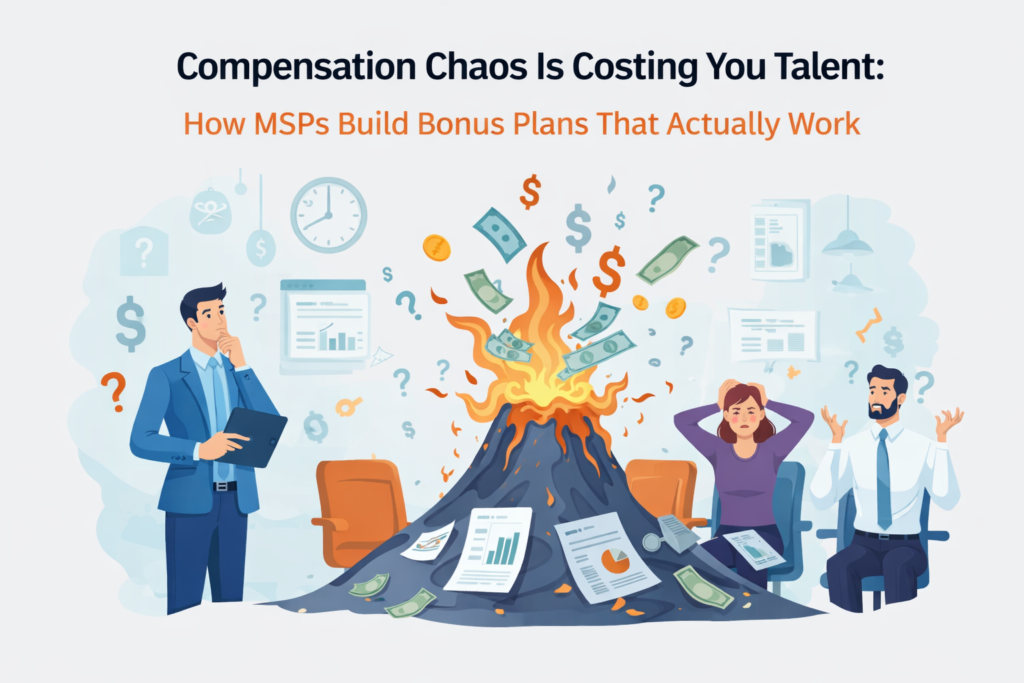Boost MSP Profits With Smarter Compensation
In today’s competitive MSP landscape, profitability hinges not only on offering cutting-edge services but also on how effectively you incentivize your team. That’s why the recent webinar, “Boost MSP Profits with This CFO’s Compensation Formula,” was such a timely and…
In today’s competitive MSP landscape, profitability hinges not only on offering cutting-edge services but also on how effectively you incentivize your team. That’s why the recent webinar, “Boost MSP Profits with This CFO’s Compensation Formula,” was such a timely and valuable discussion.
Hosted by Alternative Payments, the session brought together a powerhouse panel featuring Brandi Bonds and Sonja Pomerleau of Next Level Now. They shared actionable strategies MSPs can use to align compensation models with business goals and boost gross profit margins.

The Challenge: Compensation Misalignment
Far too often, compensation models in MSPs fail to reflect the actual impact employees have on profitability. Sales teams may be incentivized based on top-line revenue, even if the deals they close cut into margins. Customer service agents may be paid a flat rate without any consideration for client satisfaction or operational efficiency.
Next Level Now emphasized that compensation should never be “set it and forget it.” Instead, it must be treated as a strategic business lever that can influence performance, culture, and growth.
Step One: Aligning Pay with Performance Metrics
The first step in boosting profitability is ensuring that your compensation strategy rewards the behaviors and results that matter most. That means tying pay—especially variable pay—to outcomes such as:
- Gross profit contributions
- Operational efficiency
- Client satisfaction
- Upsell and retention rates
Next Level Now encouraged MSPs to take a hard look at current job descriptions and assess whether they accurately reflect what the role entails today. Then, compare compensation levels to market standards to ensure fairness and competitiveness.
Step Two: Variable Pay Models by Role
Not every employee role should be compensated the same way. The speakers discussed how role-based compensation models can help create a sense of ownership and accountability throughout the organization:
- Sales professionals should be rewarded not just for closing deals, but for contributing to healthy gross profit margins.
- Customer service reps and technicians can benefit from incentive programs tied to customer satisfaction scores, average resolution time, or internal KPIs.
- Project managers or implementation specialists might receive bonuses for coming in under budget or completing work ahead of schedule.
These kinds of metrics-based incentives ensure that compensation drives alignment, not just activity.
Step Three: Transparent, Fair, and Flexible Compensation Plans
One of the strongest themes throughout the webinar was the power of transparency. Employees want to know how their pay is determined, how they can improve their performance, and how they can grow within the organization. Clear compensation plans build trust and prevent confusion or resentment.
The panel also urged MSPs to revisit compensation structures regularly. What works for a 10-person company may not be sustainable for a 50-person team. Pay structures must evolve alongside your business and market conditions.
Beyond the Paycheck: Non-Monetary Compensation Matters Too
While much of the conversation focused on financial compensation, the panelists didn’t ignore the value of non-monetary rewards. These may include:
- Professional development opportunities and certifications
- Additional paid time off
- Wellness programs or stipends
- Flexible work arrangements
These benefits can be especially powerful when budgets are tight, and they show your employees that you care about their growth and well-being.
Creating Structure to Reduce Bias and Promote Retention
The group also stressed the importance of structured job descriptions with clearly defined skill levels and associated pay bands. This kind of framework not only helps promote internal equity but also reduces the potential for unconscious bias in hiring and promotion decisions. It’s a move that supports a fairer, more inclusive workplace—something that more and more candidates are seeking.
In Summary: Compensation is a Growth Strategy
The webinar wrapped with a clear call to action: treat your compensation model as a strategic tool. Done right, it can drive profitability, enhance employee satisfaction, reduce turnover, and create a culture of accountability.
Next Level Now encourages MSPs to:
- Review and update current job descriptions and pay against market standards.
- Implement a compensation model aligned with gross profit and business goals.
- Consider variable compensation for different roles.
- Ensure transparency in all compensation plans and make performance data accessible.
- Explore non-monetary compensation options.
- Create structured job descriptions with skill levels and matching compensation.
- Regularly revisit compensation strategies to remain competitive and relevant.
If you’re an MSP leader looking to refine your compensation model and drive stronger financial results, the team at Next Level Now is ready to help you take the next step.
Contact Next Level Now to start the conversation!
Contact Next Level Now to start the conversation!
Continue learning with Next Level insights
Compensation Chaos Is Costing You Talent: How MSPs Build Bonus Plans That Actually Work
For most MSPs, compensation is the largest controllable expense on the P&L. It’s also the most misunderstood. When compensation plans are unclear, misaligned, or copied…
New M&A Insights Podcast Drop: Why Your Finance Function Is Worth Two Turns of EBITDA
Most MSPs run their business from the bank account. And that’s exactly why they leave money on the table. In the newest episode of M&A…
Next Level Now Becomes Women-Owned Under CEO Brandi Bonds; Sonja Fridell Pomerleau Named Equity Partner & COO
Next Level Now (NLN), a leading provider of CFO-led financial and operational services for growth-focused companies, today announced a defining milestone in its evolution. Brandi…
Let’s Build the Right Financial Strategy Together
Tell us about your business, and we’ll guide you toward the best level of CFO and accounting support tailored to your growth stage.

Choose your starting point today and scale as your company grows.
Our team will reach out to discuss your needs and design a financial plan that works for you.
"*" indicates required fields



